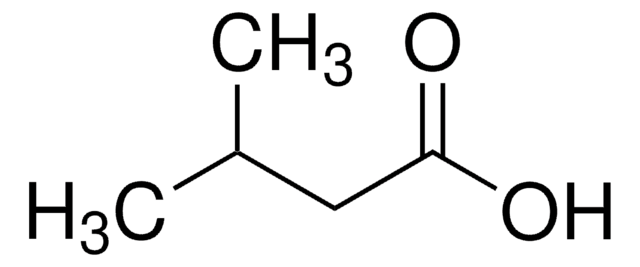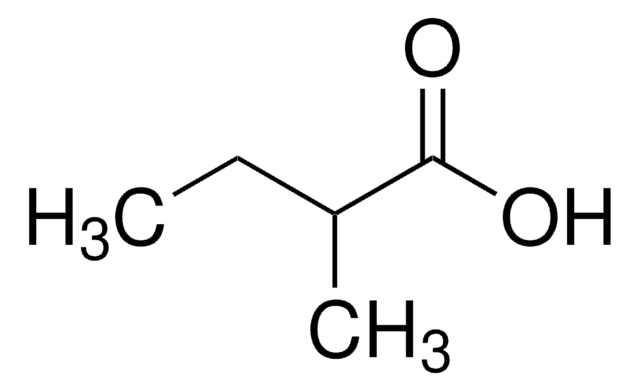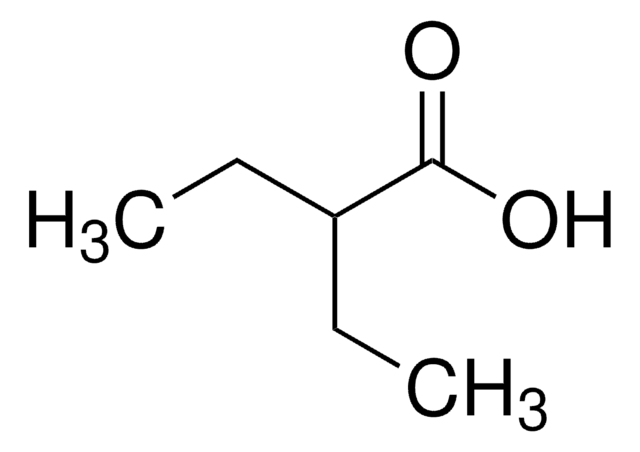19215
Butyric acid
analytical standard
About This Item
Productos recomendados
grado
analytical standard
Nivel de calidad
densidad de vapor
3.04 (vs air)
presión de vapor
0.43 mmHg ( 20 °C)
Ensayo
≥99.5% (GC)
temp. de autoignición
824 °F
caducidad
limited shelf life, expiry date on the label
lim. expl.
10 %
técnicas
HPLC: suitable
gas chromatography (GC): suitable
índice de refracción
n20/D 1.398 (lit.)
bp
162 °C (lit.)
mp
−6-−3 °C (lit.)
densidad
0.964 g/mL at 25 °C (lit.)
aplicaciones
cleaning products
cosmetics
flavors and fragrances
food and beverages
personal care
Formato
neat
cadena SMILES
CCCC(O)=O
InChI
1S/C4H8O2/c1-2-3-4(5)6/h2-3H2,1H3,(H,5,6)
Clave InChI
FERIUCNNQQJTOY-UHFFFAOYSA-N
¿Está buscando productos similares? Visita Guía de comparación de productos
Categorías relacionadas
Descripción general
Aplicación
- Development and validation of a high-performance liquid chromatographic (HPLC) method combined with UV detection to determine four short-chain fatty acids— formic acid, acetic acid, propionic acid, and butyric acid, and lactic acid in bacterial culture samples after their liquid-liquid extraction (LLE)
- Simultaneous analysis of 10 volatile and non-volatile organic acids in 18 samples of Korean traditional fermented soybean paste, doenjang, by HPLC combined with refractive index detector and gas chromatography coupled with flame ionization detector (GC-FID)
- Determination of butyric, lactic, acetic, and propionic acids in sour cassava starch waste-water samples by reversed-phase high-performance liquid chromatography (HPLC) and capillary electrophoresis (CE), both coupled with diode array detection (DAD)
- Multi-residue analysis of six short-chain fatty acids— acetic acid, propionic acid, butyric acid, isobutyric acid, valeric acid, and isovaleric acid, in biological samples of mice colon content by a gas chromatographic method combined with flame ionization detector (GC-FID)
- Packed-fiber solid phase extraction (PFSPE) of eight short-chain fatty acids using polypyrrole nanofibers, from urine samples of children for quantification by gas chromatography-mass spectrometry (GC-MS)
- Multi-residue analysis of 76 volatile compounds from jujube extract samples by gas chromatography-mass spectrometry (GC-MS) after their extraction by steam distillation combined with drop-by-drop extraction
Otras notas
Productos recomendados
Palabra de señalización
Danger
Frases de peligro
Consejos de prudencia
Clasificaciones de peligro
Acute Tox. 4 Oral - Eye Dam. 1 - Skin Corr. 1B - STOT SE 3
Órganos de actuación
Respiratory system
Código de clase de almacenamiento
8A - Combustible corrosive hazardous materials
Clase de riesgo para el agua (WGK)
WGK 1
Punto de inflamabilidad (°F)
161.6 °F - closed cup
Punto de inflamabilidad (°C)
72 °C - closed cup
Equipo de protección personal
Faceshields, Gloves, Goggles, type ABEK (EN14387) respirator filter
Elija entre una de las versiones más recientes:
¿Ya tiene este producto?
Encuentre la documentación para los productos que ha comprado recientemente en la Biblioteca de documentos.
Los clientes también vieron
Artículos
Separation of Propionic acid; Acetic acid; Heptanoic acid; Isobutyric acid; Valeric acid; Isocaproic acid; Butyric acid; Isovaleric acid
Separation of Methyl oleate; Caprylic acid; Heptanoic acid; Methyl decanoate; Methyl dodecanoate; Myristic acid; Methyl palmitate; Methyl palmitoleate; Methyl stearate; Methyl linoleate; Methyl linolenate; Acetic acid; Arachidic acid; Behenic acid; Propionic acid; Isobutyric acid; Valeric acid; Isovaleric acid; Isocaproic acid; Butyric acid
Protocolos
In this study, SPME was used for the analysis of free fatty acids in Parmesan cheese using a 65 μm Carbowax/divinylbenzene (DVB) SPME fiber. Headspace extraction of the cheese sample was conducted at 65 °C for 15 minutes and analyzed by GC with FID detection. SPME is ideal for analyzing the volatiles associated with solid food samples. The phase chemistry of the Nukol GC column provides excellent peak shape of acidic compounds.
Separation of Acetone; Acetic acid; Propionic acid; Ethyl butyrate; Ethanol; Isoamyl acetate; Isobutyric acid; 3-Methyl-2-butanol; Methyl acetate; 1-Propanol; Acetal, ≥98%, FG; 2-Methyl-1-pentanol; Butyl acetate; Ethyl propionate; 3-Pentanol; 2-Pentanol, 98%; Ethyl isobutyrate; Isobutyl acetate; Acetaldehyde; Furfural; Butyric acid; Methanol; Ethyl acetate
Nuestro equipo de científicos tiene experiencia en todas las áreas de investigación: Ciencias de la vida, Ciencia de los materiales, Síntesis química, Cromatografía, Analítica y muchas otras.
Póngase en contacto con el Servicio técnico









